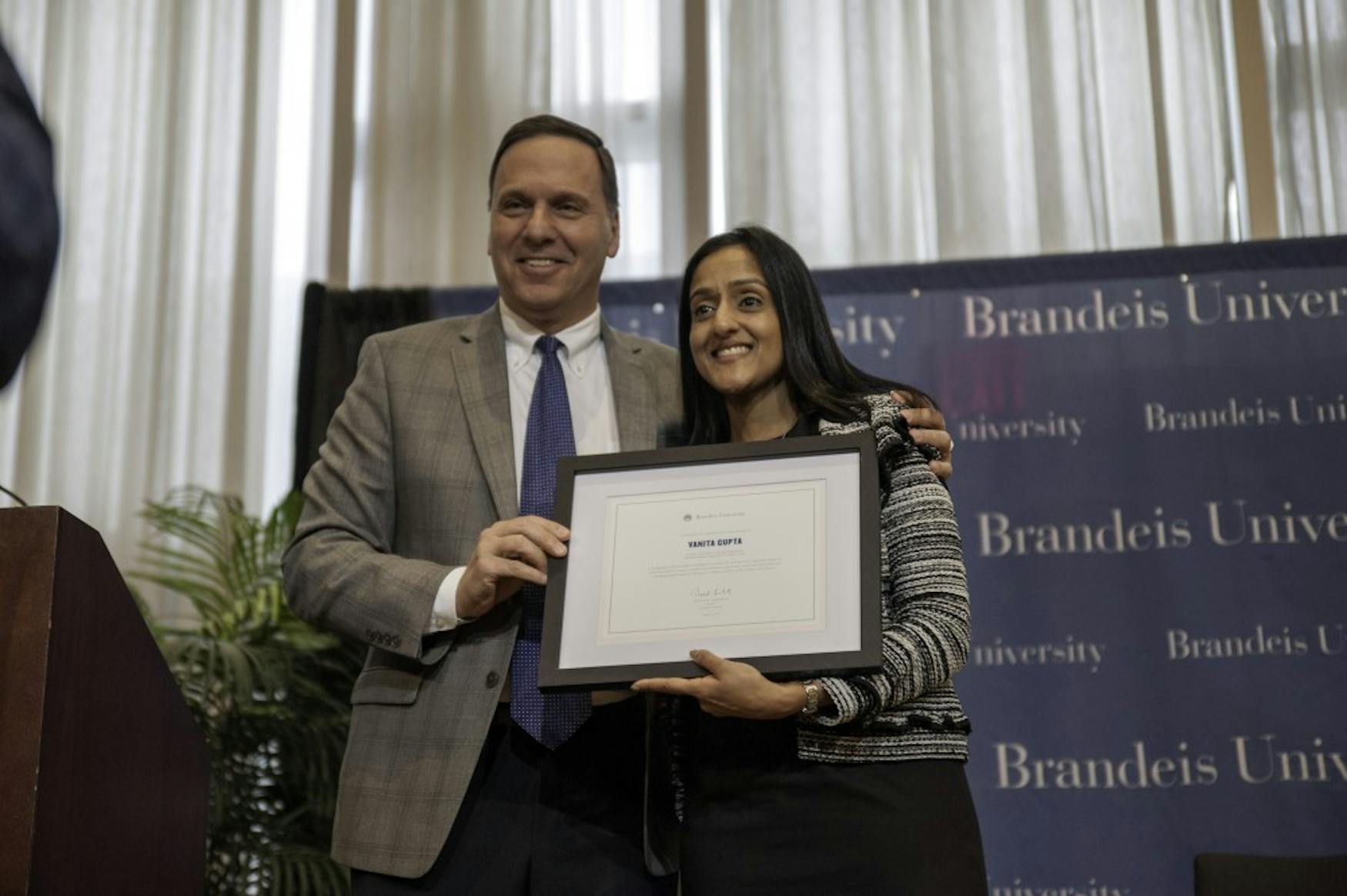Richman Fellow discusses cultivating hope amid chaos
For civil rights attorney Vanita Gupta, the future of American human and civil rights reform lies in one simple word: hope. Even as the Trump administration backpedals on years of legislation and civil rights protections, hope will drive reform, Gupta asserted in a lecture last Tuesday.
The 2018 Richman Distinguished Fellow in Public Life recipient drew upon her personal experience in the field of civil rights law for the event, which recognized her dedication to strengthening democratic institutions and improving social justice.
Gupta, the president and CEO of the Leadership Conference on Civil and Human Rights, previously served as the principal deputy assistant attorney general and acting head of the Civil Rights Division at the U.S. Department of Justice under President Barack Obama. She has also held leadership positions in the ACLU and the NAACP.
During her time in the DOJ, Gupta’s division sued North Carolina, arguing that the state’s House Bill 2 infringed upon transgender individuals’ federal rights. The department also conducted an investigation into the Baltimore Police Department, finding that BPD engaged in a pattern of unconstitutional stops, searches and arrests that unjustly targeted African-Americans.
Throughout her years in law, Gupta has seen both the highs of legal victories and the lows of abridged rights. However, she told the audience, “I think it’s no overstatement to say that we are at a most perilous time for the causes of justice and fairness and inclusion.”
Yet, despite threats to legal protections for many groups and an “acute sense of whiplash from the last administration to this one,” it is crucial to maintain a sense of hope and optimism, Gupta asserted.
“Sometimes in the face of these overwhelming setbacks, I can’t help but feel discouraged,” she admitted. “But I’m a civil rights lawyer, and I have been my whole adult career. And as a civil rights lawyer I often talk about hope; in fact, I don’t think you can be a civil rights lawyer without a profound reservoir of hope.”
Hope, she added, is a discipline, the strength of which lies in “the stories of real people and real communities and real leaders who have stared down injustice over some of the most oppressive context and times, and they’ve decided to fight back, sometimes with the help of government and sometimes without,” she said. “And it lies with the knowledge that, though the arc of our universe may be long, very long, it bends towards justice.”
The course of American history is altered by those who take a conscious stand against infinite odds, Gupta said, citing examples of students standing up against gun violence or athletes taking a knee against racism.
“There is nothing automatic or inevitable about that kind of hope and determination. Our nation’s progress has not been guaranteed. And it never will be,” she said, adding, “Our values, our constitution, our democracy — they don’t protect themselves. Instead, our progress has really been as a result of people pushing, sometimes inside government, but many, many times outside.”
This progress, she said, has momentum. Gupta learned this lesson firsthand as a 26-year-old attorney with the NAACP, when she traveled to Tulia, Texas, to work a case involving a drug sting. The sting had resulted in 46 arrests, including nearly 15 percent of the town’s Black population. It was later revealed, however, that the undercover detective behind the arrests had not kept records, and the evidence he gathered could not be tied to the suspects.
Gupta and her team obtained pardons and a $6 million settlement for the victims, with the case serving as a testament to the momentum of hope and progress, she said. “Although it can feel like it comes from nowhere and nothing, it grows,” she emphasized. “And there’s momentum to hope; there’s a kind of multiplying effect that really can’t be explained. And it’s powerful.”
This momentum is best applied when individuals form coalitions, she said, arguing that America is built on a history of people coming together and fighting for change. “This is why, despite the setbacks in Washington today, I remain deeply hopeful about reform, and about the progress that this country has made,” she said.
She later added, “That’s the thing about hope; it has always been built from the ground up, from bold communities and courageous individuals, especially young people, who have the vision and the heart to make our country live up to its ideals.”
Ongoing challenges to civil and human rights have even prompted some to become involved in politics, indicating a promising start for a brighter future, Gupta said.
“It’s really the hope that men and women today can build a more just, a more inclusive, a more fair future for the children of tomorrow. … And it’s the hope that despite all the zigs and the zags of our nation’s history, that we are going to continue to ensure that America marches forward, imperfectly, but inexorably,” she said.
This momentum and dedication fuel her hope and drive her passion for civil rights, she said.
“Civil rights work is designed to build momentum, and it’s designed to persist and endure,” Gupta concluded before fielding audience questions.
“Your resiliency gives me hope, and your determination gives me hope. And the struggle will always give me hope.”




Please note All comments are eligible for publication in The Justice.